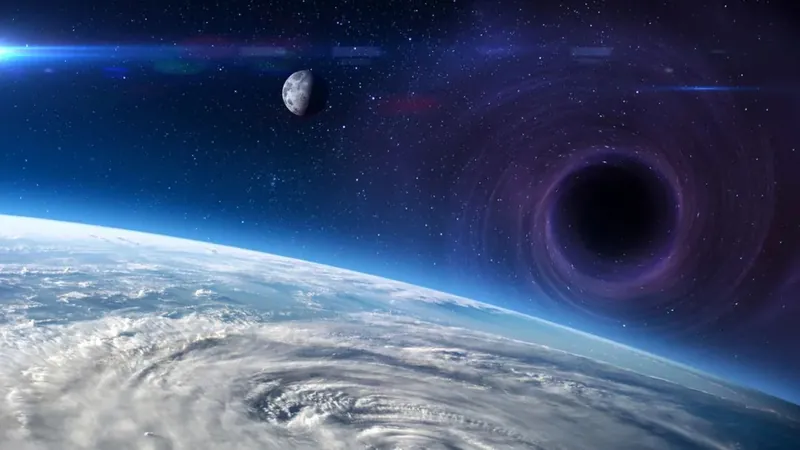
Every Decade, a Mysterious 'Primordial' Black Hole Might Zoom Through Our Solar System!
2024-09-24
Author: Wei
Introduction
In an exciting development for astrophysics, researchers have proposed that if microscopic black holes, known as primordial black holes, formed just after the Big Bang truly exist, then we could expect at least one of these elusive entities to pass through our solar system every ten years. This groundbreaking study indicates that such black holes could create tiny gravitational disturbances detectable by scientists.
The Mystery of Dark Matter
The potential existence of these primordial black holes offers a tantalizing clue into one of the cosmos's greatest mysteries: dark matter. Researchers believe that dark matter, which constitutes approximately 85% of the universe's total mass, is composed of yet-undiscovered particles. So far, attempts to identify these particles have been fruitless. As a result, primordial black holes are being explored as a viable alternative explanation for dark matter.
What are Primordial Black Holes?
So, what exactly are primordial black holes? Unlike the supermassive black holes found at the centers of galaxies, which can contain billions of solar masses, primordial black holes are theorized to be significantly lighter—up to 10 billion times less massive than our Sun and comparable in size to a hydrogen atom. These tiny black holes might have formed from density fluctuations in the universe’s infancy.
The Role of Black Holes in the Universe
According to data, roughly 86% of the universe is thought to be formed from dark matter, which we infer through its gravitational influence on visible objects. However, because black holes do not emit light, they typically go unnoticed unless they interact with stars or other matter. This makes subtle gravitational effects from passing primordial black holes a prime focus for study.
Speculations on Encounters
Sarah Geller, one of the study's co-authors and a theoretical physicist at the University of California, Santa Cruz, speculated on the nature of these encounters. She noted that while their team considered various scenarios—including what might happen if a primordial black hole were to collide with Earth or the Moon—the lottery of space is vast. The chances of such a direct hit are extremely low.
Research Findings
Instead, the researchers aimed to identify the influence of primordial black holes on larger celestial bodies whose orbits could show measurable distortions. They zeroed in on the inner planets—Mercury, Venus, Earth, and Mars—and their findings suggest that one of these black holes could swing by our cosmic neighborhood approximately every decade. Geller hinted that there could be numerous undetected flybys already occurring since the advent of advanced detection technology.
Cautions and Future Work
However, it's essential to approach their conclusions with caution. The researchers are not claiming that primordial black holes are confirmed to exist or that they make up all of dark matter. Instead, they present their findings as a hypothetical framework that indicates how often these fleeting encounters might occur if primordial black holes do exist.
Collaboration for Enhanced Precision
The current models utilized for this study rely on basic computational simulations. To enhance precision, the team plans to collaborate with astrophysicists at the Paris Observatory, who specialize in orbital dynamics. This collaboration could be crucial in applying sophisticated methods to real solar system data, helping researchers distinguish between potential signals of primordial black holes and the normal variability expected in celestial measurements.
Implications of Detecting Primordial Black Holes
Astronomically speaking, the detection of primordial black holes would be a monumental leap forward. Although they may resemble other small mass objects in theory, establishing distinctive characteristics of primordial black holes would help make follow-up observations more effective and targeted. Such advancements could open new avenues to solve the longstanding puzzle of dark matter and deepen our understanding of the universe.
Conclusion
The implications of this study are vast, as it suggests we live amidst unseen forces that could reshape our understanding of cosmology. Stay tuned to find out how this search for the shadows of primordial black holes might illuminate the mysteries of dark matter!

 Brasil (PT)
Brasil (PT)
 Canada (EN)
Canada (EN)
 Chile (ES)
Chile (ES)
 España (ES)
España (ES)
 France (FR)
France (FR)
 Hong Kong (EN)
Hong Kong (EN)
 Italia (IT)
Italia (IT)
 日本 (JA)
日本 (JA)
 Magyarország (HU)
Magyarország (HU)
 Norge (NO)
Norge (NO)
 Polska (PL)
Polska (PL)
 Schweiz (DE)
Schweiz (DE)
 Singapore (EN)
Singapore (EN)
 Sverige (SV)
Sverige (SV)
 Suomi (FI)
Suomi (FI)
 Türkiye (TR)
Türkiye (TR)